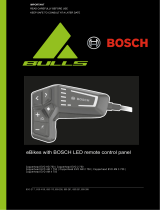
8
TROUBLESHOOTING / FAQ
After installing my Luftkappe, the fork is not extending to full travel, what is
happening?
After installation, the fork should extend to within about +/-2mm of its original travel when the fork
is unweighted (lift front wheel o the ground to allow weight of wheel to pull on fork). If it doesn’t,
this is a sign that one or more of the following things has happened:
1. The foot bolts were not done up with the fork at full extension. This must be done or the
fork will have a vacuum in the lowers that sucks it down. Undo the foot bolts and tap them
loose, then do them back up at full extension.
2. The piston was inserted too far into the chamber before the seal head was installed,
trapping a lot of air in the negative chamber that the air in the positive chamber is not able
to overcome in order to reach the equalisation port. You can try forcibly extending the fork
to reach the equalisation point, and/or use higher pressure in there to assist you. If it does
equalise but still stays sucked down, this is not the cause.
3. You do not have the correct air shaft in there. If you have changed the shaft, this is very
likely the cause - there are multiple variants of a “150mm” air shaft for example, depending
on your wheel size and which fork you have (Lyrik/Yari or Pike). Replace the shaft with the
correct one.
4. There is excessive grease in the negative chamber, or the topout bumper was not removed.
Make sure these are removed.
5. There is some fault with the main piston quad ring that is preventing it from sealing
properly, such as debris jamming in between it and the stanchion. This will typically cause
complete collapse of the fork.
6. You are reading the wrong sag gradients. This happens to the best of us!
I can forcibly extend my fork about 20mm past where it extends to before it hits a hard
stop, what’s going on?
This is pneumatic topout in action - topout bumpers are not necessary in this fork. Being able to
forcibly extend it a considerable distance past its proper topout point is normal and will not occur
in use.
My fork sags just under the weight of the bike, why?
It should sag a couple of mm, because the bike has weight. If your suspension does not sag at all
under the bike’s weight then it is excessively sticky or preloaded. Think about it this way - if you,
the rider, weigh 90kg (200lbs) and the sprung mass of your bike weighs 10kg (22lbs), your bike’s
sprung mass constitutes about 10% of the total sprung mass. If you run approximately 20mm sag
in the fork when the rider is on the bike, then it makes sense that you’d see roughly 2mm sag with
no rider on the bike.















